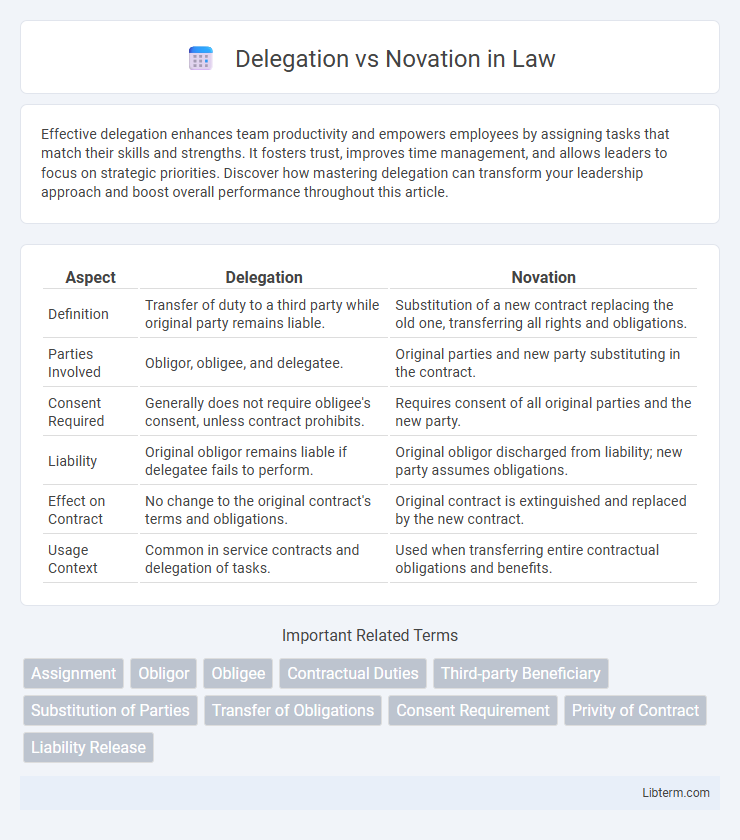Effective delegation enhances team productivity and empowers employees by assigning tasks that match their skills and strengths. It fosters trust, improves time management, and allows leaders to focus on strategic priorities. Discover how mastering delegation can transform your leadership approach and boost overall performance throughout this article.
Table of Comparison
| Aspect | Delegation | Novation |
|---|---|---|
| Definition | Transfer of duty to a third party while original party remains liable. | Substitution of a new contract replacing the old one, transferring all rights and obligations. |
| Parties Involved | Obligor, obligee, and delegatee. | Original parties and new party substituting in the contract. |
| Consent Required | Generally does not require obligee's consent, unless contract prohibits. | Requires consent of all original parties and the new party. |
| Liability | Original obligor remains liable if delegatee fails to perform. | Original obligor discharged from liability; new party assumes obligations. |
| Effect on Contract | No change to the original contract's terms and obligations. | Original contract is extinguished and replaced by the new contract. |
| Usage Context | Common in service contracts and delegation of tasks. | Used when transferring entire contractual obligations and benefits. |
Understanding Delegation: Definition and Key Concepts
Delegation involves transferring contractual duties from the original obligor to a third party, while the original party remains liable unless explicitly released. Key concepts include the delegator (original party delegating duties), delegatee (party assuming the duties), and obligee (party receiving performance). This process allows flexibility in fulfilling obligations without altering the original contract terms, distinct from novation which replaces one party entirely.
What is Novation? Core Principles Explained
Novation is a legal process that transfers both rights and obligations from one party to another, effectively replacing the original contract with a new one. Core principles of novation include the mutual consent of all parties involved, the extinguishment of the original contract, and the creation of a new contractual relationship. This distinguishes novation from delegation, where the original party retains liability while simply assigning duties to a third party.
Delegation vs Novation: Fundamental Differences
Delegation involves transferring contractual duties to a third party while the original party remains liable for performance, whereas novation replaces the original party with a new party, extinguishing the initial contract. In delegation, the obligee's consent is not always required, but novation necessitates agreement from all parties involved to validate the new contract. The key distinction lies in liability and consent: delegation maintains the original party's liability, while novation shifts it entirely to the new party through mutual agreement.
Legal Implications: Delegation vs Novation
Delegation transfers contractual duties to a third party while the original party remains liable, whereas novation replaces the original contract entirely, releasing the original party from obligations and creating a new contract with the third party. Legal implications of delegation often involve the delegator's continuing liability, contrasting with novation's requirement for the consent of all involved parties to effectuate the contractual substitution. Courts typically enforce novation strictly, emphasizing clear agreement and intent to discharge prior contractual obligations, distinguishing it sharply from the more permissive delegation arrangement.
When to Use Delegation in Contract Management
Delegation in contract management is ideal when the original party assigns contractual duties to a third party while retaining primary liability for performance. Use delegation when the contract allows the transfer of obligations without needing the other party's consent, ensuring flexibility in resource management and operational efficiency. It is particularly suitable for tasks that do not materially alter the contract terms or increase risk exposure to the original parties.
Appropriate Scenarios for Novation in Business Transactions
Novation is appropriate in business transactions when the original contract obligations need to be replaced by a new party, such as during corporate mergers, acquisitions, or when a supplier is changed without disrupting the contract terms. It legally discharges the original party and substitutes a new one, ensuring continuity and clarity in contractual responsibilities. This process is vital for transferring both rights and obligations, which cannot be achieved through simple delegation.
Benefits and Risks of Delegation
Delegation allows a party to transfer contractual duties to another, reducing workload and enabling specialization, but the original party remains liable if the delegate fails to perform. This risk of retained liability can complicate enforcement and increase potential legal exposure. Proper documentation and clear agreements are essential to mitigate risks and ensure smooth delegation.
Advantages and Drawbacks of Novation
Novation transfers all rights and obligations from the original party to a new party, providing clear legal certainty and releasing the original party from liability. This process facilitates contract restructuring and risk management, especially in complex business transactions. However, novation requires the consent of all involved parties, which can delay agreements and complicate negotiations compared to delegation.
Practical Examples: Delegation and Novation in Real Contracts
Delegation occurs when a party transfers their contractual duties to a third party while remaining liable for performance, such as a subcontractor handling work under a primary contractor's service agreement. Novation replaces an original party with a new one, extinguishing the original obligations and requiring all parties' consent, exemplified by a business sale transferring contract rights and liabilities to the purchasing company. In practice, delegation is common in construction projects to assign tasks, whereas novation is essential in financial agreements when debt ownership changes hands.
Choosing Between Delegation and Novation: Decision Criteria
Choosing between delegation and novation depends primarily on the desired transfer of obligations and consent requirements. Delegation allows the original party to transfer duties while remaining liable, suitable when continued responsibility is necessary, whereas novation substitutes a new party, releasing the original party from obligations, ideal for complete liability transfer. Key decision criteria include the necessity of consent from all parties, the intended liability outcome, and the contractual terms governing assignment or substitution.
Delegation Infographic

 libterm.com
libterm.com